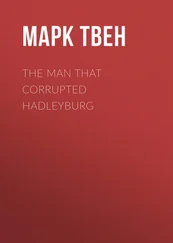Mark Twain - The Man That Corrupted Hadleyburg and Other Stories
Здесь есть возможность читать онлайн «Mark Twain - The Man That Corrupted Hadleyburg and Other Stories» весь текст электронной книги совершенно бесплатно (целиком полную версию без сокращений). В некоторых случаях можно слушать аудио, скачать через торрент в формате fb2 и присутствует краткое содержание. Год выпуска: 2004, Жанр: Классическая проза, Юмористическая проза, на английском языке. Описание произведения, (предисловие) а так же отзывы посетителей доступны на портале библиотеки ЛибКат.
- Название:The Man That Corrupted Hadleyburg and Other Stories
- Автор:
- Жанр:
- Год:2004
- ISBN:нет данных
- Рейтинг книги:4 / 5. Голосов: 1
-
Избранное:Добавить в избранное
- Отзывы:
-
Ваша оценка:
- 80
- 1
- 2
- 3
- 4
- 5
The Man That Corrupted Hadleyburg and Other Stories: краткое содержание, описание и аннотация
Предлагаем к чтению аннотацию, описание, краткое содержание или предисловие (зависит от того, что написал сам автор книги «The Man That Corrupted Hadleyburg and Other Stories»). Если вы не нашли необходимую информацию о книге — напишите в комментариях, мы постараемся отыскать её.
The Man That Corrupted Hadleyburg and Other Stories — читать онлайн бесплатно полную книгу (весь текст) целиком
Ниже представлен текст книги, разбитый по страницам. Система сохранения места последней прочитанной страницы, позволяет с удобством читать онлайн бесплатно книгу «The Man That Corrupted Hadleyburg and Other Stories», без необходимости каждый раз заново искать на чём Вы остановились. Поставьте закладку, и сможете в любой момент перейти на страницу, на которой закончили чтение.
Интервал:
Закладка:
TRAVELLING WITH A REFORMER
Last spring I went out to Chicago to see the Fair, and although I did not see it my trip was not wholly lost—there were compensations. In New York I was introduced to a Major in the regular army who said he was going to the Fair, and we agreed to go together. I had to go to Boston first, but that did not interfere; he said he would go along and put in the time. He was a handsome man and built like a gladiator. But his ways were gentle, and his speech was soft and persuasive. He was companionable, but exceedingly reposeful. Yes, and wholly destitute of the sense of humour. He was full of interest in everything that went on around him, but his serenity was indestructible; nothing disturbed him, nothing excited him.
But before the day was done I found that deep down in him somewhere he had a passion, quiet as he was—a passion for reforming petty public abuses. He stood for citizenship—it was his hobby. His idea was that every citizen of the republic ought to consider himself an unofficial policeman, and keep unsalaried watch and ward over the laws and their execution. He thought that the only effective way of preserving and protecting public rights was for each citizen to do his share in preventing or punishing such infringements of them as came under his personal notice.
It was a good scheme, but I thought it would keep a body in trouble all the time; it seemed to me that one would be always trying to get offending little officials discharged, and perhaps getting laughed at for all reward. But he said no, I had the wrong idea: that there was no occasion to get anybody discharged; that in fact you mustn't get anybody discharged; that that would itself be a failure; no, one must reform the man—reform him and make him useful where he was.
'Must one report the offender and then beg his superior not to discharge him, but reprimand him and keep him?'
'No, that is not the idea; you don't report him at all, for then you risk his bread and butter. You can act as if you are going to report him—when nothing else will answer. But that's an extreme case. That is a sort of force, and force is bad. Diplomacy is the effective thing. Now if a man has tact—if a man will exercise diplomacy—'
For two minutes we had been standing at a telegraph wicket, and during all this time the Major had been trying to get the attention of one of the young operators, but they were all busy skylarking. The Major spoke now, and asked one of them to take his telegram. He got for reply:
'I reckon you can wait a minute, can't you?' And the skylarking went on.
The Major said yes, he was not in a hurry. Then he wrote another telegram:
'President Western Union Tel. Co.:
'Come and dine with me this evening. I can tell you how business is
conducted in one of your branches.'
Presently the young fellow who had spoken so pertly a little before reached out and took the telegram, and when he read it he lost colour and began to apologise and explain. He said he would lose his place if this deadly telegram was sent, and he might never get another. If he could be let off this time he would give no cause of complaint again. The compromise was accepted.
As we walked away, the Major said:
'Now, you see, that was diplomacy—and you see how it worked. It wouldn't do any good to bluster, the way people are always doing. That boy can always give you as good as you send, and you'll come out defeated and ashamed of yourself pretty nearly always. But you see he stands no chance against diplomacy. Gentle words and diplomacy—those are the tools to work with.'
'Yes, I see: but everybody wouldn't have had your opportunity. It isn't everybody that is on those familiar terms with the President of the Western Union.'
'Oh, you misunderstand. I don't know the President—I only use him diplomatically. It is for his good and for the public good. There's no harm in it.'
I said with hesitation and diffidence:
'But is it ever right or noble to tell a lie?'
He took no note of the delicate self-righteousness of the question, but answered with undisturbed gravity and simplicity:
'Yes, sometimes. Lies told to injure a person and lies told to profit yourself are not justifiable, but lies told to help another person, and lies told in the public interest—oh, well, that is quite another matter. Anybody knows that. But never mind about the methods: you see the result. That youth is going to be useful now, and well-behaved. He had a good face. He was worth saving. Why, he was worth saving on his mother's account if not his own. Of course, he has a mother—sisters, too. Damn these people who are always forgetting that! Do you know, I've never fought a duel in my life—never once—and yet have been challenged, like other people. I could always see the other man's unoffending women folks or his little children standing between him and me. They hadn't done anything—I couldn't break their hearts, you know.'
He corrected a good many little abuses in the course of the day, and always without friction—always with a fine and dainty 'diplomacy' which left no sting behind; and he got such happiness and such contentment out of these performances that I was obliged to envy him his trade—and perhaps would have adopted it if I could have managed the necessary deflections from fact as confidently with my mouth as I believe I could with a pen, behind the shelter of print, after a little practice.
Away late that night we were coming up-town in a horse-car when three boisterous roughs got aboard, and began to fling hilarious obscenities and profanities right and left among the timid passengers, some of whom were women and children. Nobody resisted or retorted; the conductor tried soothing words and moral suasion, but the toughs only called him names and laughed at him. Very soon I saw that the Major realised that this was a matter which was in his line; evidently he was turning over his stock of diplomacy in his mind and getting ready. I felt that the first diplomatic remark he made in this place would bring down a landslide of ridicule upon him, and maybe something worse; but before I could whisper to him and check him he had begun, and it was too late. He said, in a level and dispassionate tone:
'Conductor, you must put these swine out. I will help you.'
I was not looking for that. In a flash the three roughs plunged at him. But none of them arrived. He delivered three such blows as one could not expect to encounter outside the prize-ring, and neither of the men had life enough left in him to get up from where he fell. The Major dragged them out and threw them off the car, and we got under way again.
I was astonished: astonished to see a lamb act so; astonished at the strength displayed, and the clean and comprehensive result; astonished at the brisk and business-like style of the whole thing. The situation had a humorous side to it, considering how much I had been hearing about mild persuasion and gentle diplomacy all day from this pile-driver, and I would have liked to call his attention to that feature and do some sarcasms about it; but when I looked at him I saw that it would be of no use—his placid and contented face had no ray of humour in it; he would not have understood. When we left the car, I said:
'That was a good stroke of diplomacy—three good strokes of diplomacy, in fact.'
'That? That wasn't diplomacy. You are quite in the wrong. Diplomacy is a wholly different thing. One cannot apply it to that sort; they would not understand it. No, that was not diplomacy; it was force.'
'Now that you mention it, I—yes, I think perhaps you are right.'
'Right? Of course I am right. It was just force.'
'I think, myself, it had the outside aspect of it. Do you often have to reform people in that way?'
Читать дальшеИнтервал:
Закладка:
Похожие книги на «The Man That Corrupted Hadleyburg and Other Stories»
Представляем Вашему вниманию похожие книги на «The Man That Corrupted Hadleyburg and Other Stories» списком для выбора. Мы отобрали схожую по названию и смыслу литературу в надежде предоставить читателям больше вариантов отыскать новые, интересные, ещё непрочитанные произведения.
Обсуждение, отзывы о книге «The Man That Corrupted Hadleyburg and Other Stories» и просто собственные мнения читателей. Оставьте ваши комментарии, напишите, что Вы думаете о произведении, его смысле или главных героях. Укажите что конкретно понравилось, а что нет, и почему Вы так считаете.










